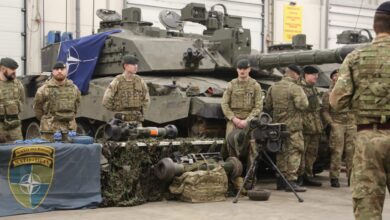Hezbollah fires missiles at Israel in revenge for killing of top commander

Smoke rises from the site of an Israeli airstrike on Zibqin in southern Lebanon on August 25, 2024, amid escalating cross-border tensions as fighting continues between Israel and Hamas militants in the Gaza Strip.
Kawnat Haju | AFP | Getty Images
Hezbollah launched hundreds of missiles and drones into Israel on Sunday in retaliation for the assassination of a senior commander in Beirut last month, the Iran-backed movement said, as Israel’s cabinet met to prepare for a response.
The Israeli military said its jets had attacked targets in Lebanon shortly before the airstrikes as the military assessed that Hezbollah was preparing to launch an attack.
Hezbollah said it had launched more than 320 Katyusha rockets at Israel, hitting 11 military targets. It said the attack completed the “first phase” of its response to the assassination of Fuad Shukr, a senior commander, in Beirut, but that the full response would take “some time”.
Expectations of an escalation between the two sides have been rising since a rocket attack on the Israeli-occupied Golan Heights last month killed 12 young men and the Israeli military assassinated Shukr in Beirut in response.
Prime Minister Benjamin Netanyahu’s office announced that the Israeli cabinet will meet at 7 a.m. (0400 GMT).
Foreign Minister Israel Katz said Israel would respond to developments on the ground but did not want all-out war. Defense Minister Yoav Gallant said Israel would do whatever was necessary to defend itself.
“We have conducted precision strikes in Lebanon to prevent an imminent threat to Israeli citizens. We are closely monitoring developments in Beirut and are determined to use all available means to protect our citizens,” Gallant said in a statement.
A Hezbollah UAV flies over northern Israel on August 25, 2024.
Jalaa Marey | Afp | Getty Images
Most of the Israeli air strikes were against targets in southern Lebanon, but the Israeli military was ready to strike wherever there was a threat, an Israeli military spokesman said.
Gallant declared a state of emergency and flights to and from Ben Gurion airport in Tel Aviv were suspended for about 90 minutes, but the airport authority said normal operations were expected to resume at 7 a.m.
In northern Israel, sirens sounded and explosions were heard around several areas as Israel’s Iron Dome air defense system shot down rockets coming from southern Lebanon. Israel’s Magen David Adom ambulance service said it was on high alert nationwide.
The Israeli military has issued civil defense guidelines from central Israel to the north, restricting gatherings but allowing people to go to work as long as they can get to an air raid shelter quickly. No casualties were immediately reported in Israel, according to the ambulance service.
Concerns about regional conflict
A security source in Lebanon said at least 40 Israeli air strikes hit several towns in the south of the country in one of the heaviest bombings since fighting began in October.
A boy runs past cars destroyed in a recent Israeli airstrike on August 24, 2024 in Mays Al-Jabal, Lebanon.
Chris Mcgrath | News Getty Images | Getty Images
A resident of the southern Lebanese town of Zibqeen, about 7 km (4 miles) from the border, told Reuters it was the first time he had woken up “to the sound of planes and loud rocket explosions – even before dawn prayers. It felt like the end of the world.”
Israeli Army Radio, citing defense officials, said the military assessed that Hezbollah was preparing to fire hundreds of rockets into central Israel in an attack planned for 5 a.m.
About 100 Israeli jets reportedly intercepted Hezbollah missile attacks, which began half an hour earlier, adding that the military assessed the subsequent Hezbollah attack as “improvised”.
“Dozens of (Israeli Air Force) jets are currently attacking targets in various locations in southern Lebanon. We are continuing to eliminate threats and strike hard at the Hezbollah terrorist organization,” said a military spokesman, Rear Admiral Daniel Hagari.
The escalation between Israel and Hezbollah has raised concerns about a broader regional conflict that could potentially involve both the United States and Iran. President Joe Biden is closely monitoring events, the White House said.
A Hezbollah UAV is intercepted by the Israeli Air Force over northern Israel on August 25, 2024.
Jalaa Marey | Afp | Getty Images
“At his direction, senior US officials have been in constant communication with their Israeli counterparts. We will continue to support Israel’s right to self-defense and we will continue to work for regional stability,” National Security Council spokesman Sean Savett said.
The air strikes came as negotiators were meeting in Cairo in a final attempt to end fighting in Gaza and exchange Israeli and foreign hostages for Palestinian prisoners.
Hezbollah fired rockets into Israel shortly after Hamas militants launched an attack on Israel on October 7. Hezbollah and Israel have been exchanging fire since then, while avoiding a serious escalation as fighting rages south in Gaza.
That delicate balance appears to have changed after the attack in the Golan Heights, for which Hezbollah denied responsibility, and the assassination of Shukr, one of Hezbollah’s most senior military commanders in Beirut.
Shukr’s death in an airstrike came shortly after the assassination of Hamas political leader Ismail Haniyeh in Tehran, leading to Iran’s vow of revenge against Israel.





